| Listing 1 - 9 of 9 |
Sort by
|

ISBN: 0520080459 0520082044 0520919173 0585098700 9780585098708 9780520080454 9780520919174 058528203X 9780585282039 0520208978 Year: 1997 Volume: 1 Publisher: Berkeley, Calif. University of California Press
Abstract | Keywords | Export | Availability | Bookmark
 Loading...
Loading...Choose an application
- Reference Manager
- EndNote
- RefWorks (Direct export to RefWorks)
Discourse ethics represents an exciting new development in neo-Kantian moral theory. William Rehg offers an insightful introduction to its complex theorization by its major proponent, Jürgen Habermas, and demonstrates how discourse ethics allows one to overcome the principal criticisms that have been leveled against neo-Kantianism. Addressing both "commun-itarian" critics who argue that universalist conceptions of justice sever moral deliberation from community traditions, and feminist advocates of the "ethics of care" who stress the moral significance of caring for other individuals, Rehg shows that discourse ethics combines impartiality with solidarity. He provides the first systematic reconstruction of Habermas's theory and explores its relationship to the work of such contemporary philosophers as Charles Taylor. His book articulates a bold alternative to the split between the "right" and the "good" in moral theory and will greatly interest philosophers, social and legal scholars, and political theorists.
History as a science --- Historiography --- History --- -Philosophy --- Historiography. --- Discourse ethics --- Philosophy & Religion --- Philosophy --- History & Archaeology --- History - General --- Philosophy. --- -Annals --- Auxiliary sciences of history --- Historical criticism --- Authorship --- Criticism --- -Historical criticism --- Annals --- Argumentation ethics --- History, Modern --- Ethics --- Habermas, Jürgen --- Ethics [Modern ] --- 20th century --- Ethics, Modern --- PHILOSOPHY / Political --- Habermas, Jürgen. --- Discourse ethics.
Book
ISBN: 1282240404 9786612240409 0262255316 9780262255318 9781282240407 0262182718 9780262182713 Year: 2009 Publisher: Cambridge, Mass. MIT Press
Abstract | Keywords | Export | Availability | Bookmark
 Loading...
Loading...Choose an application
- Reference Manager
- EndNote
- RefWorks (Direct export to RefWorks)
This text is a proposal for an interdisciplinary context-sensitive framework for assessing the strength of scientific arguments that melds Jürgen Habermas's discourse theory and sociological contextualism.
Science --- Debates and debating. --- Persuasion (Rhetoric) --- Philosophy. --- Habermas, Jürgen. --- Argumentation --- Speaking --- Normal science --- Philosophy of science --- Habŏmasŭ, Wirŭgen --- Habŏmasŭ --- Khabermas, I︠U︡. --- Khabermas, I︠U︡rgen --- Ha-pei-ma-ssu, Yu-erh-ken --- Habeimasi --- הברמאס, יורגן --- יורגן הברמס --- 哈贝马斯 --- Habermas, Jürgen --- Rhetoric --- Forensics (Public speaking) --- Oratory --- Elocution --- Public speaking --- Discussion --- Habermas, Jürgen --- SOCIAL SCIENCES/Political Science/Political & Social Theory --- PHILOSOPHY/General --- Habermas, Jurgen.
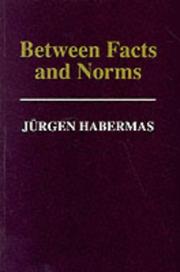
ISBN: 0745612296 0745620116 9780745612294 Year: 1996 Publisher: Cambridge : Polity press,
Abstract | Keywords | Export | Availability | Bookmark
 Loading...
Loading...Choose an application
- Reference Manager
- EndNote
- RefWorks (Direct export to RefWorks)
Political philosophy. Social philosophy --- Democracy --- Rule of law --- Sociological jurisprudence --- Démocratie --- Règle de droit --- Sociologie juridique --- Social aspects --- Aspect social --- --Droit --- --Sociological jurisprudence --- Sociological jurisprudence. --- Philosophie politique --- --État de droit --- --Social aspects --- Social aspects. --- #SBIB:316.21H22 --- #SBIB:17H20 --- #SBIB:AANKOOP --- Theoretische sociologie: neo-Marxisten --- Sociale wijsbegeerte: algemeen --- Démocratie --- Règle de droit --- Droit --- Democracy - Social aspects --- Rule of law - Social aspects --- Democracy - Social aspects. --- État de droit
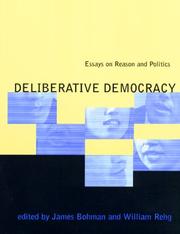
ISBN: 0262522411 0262024349 058500322X 9780585003221 9780262522410 9780262024341 0262268930 9780262268936 0262311259 1282099809 9786612099809 Year: 1997 Publisher: Cambridge, Mass. MIT Press
Abstract | Keywords | Export | Availability | Bookmark
 Loading...
Loading...Choose an application
- Reference Manager
- EndNote
- RefWorks (Direct export to RefWorks)
"The anthology opens with four key essays - by Jon Elster, Jurgen Habermas, Joshua Cohen, and John Rawls - that helped establish the current inquiry into deliberative models of democracy. The nine essays that follow represent the latest efforts of leading democratic theorists to tackle various problems of deliberative democracy. All the contributions address tensions that arise between reason and politics in a democracy inspired by the ideal of achieving reasoned agreement among free and equal citizens. Although the authors approach the topic of deliberation from different perspectives, they all aim to provide a theoretical basis for a more robust democratic practice."--Jacket.
Democracy. --- Representative government and representation. --- Political systems --- Legal theory and methods. Philosophy of law --- Deliberative democracy. --- Democracy --- Representative government and representation --- Démocratie --- Gouvernement représentatif --- Deliberative democracy --- Parliamentary government --- Political representation --- Representation --- Self-government --- Constitutional history --- Constitutional law --- Political science --- Elections --- Republics --- Suffrage --- Discursive democracy --- Equality --- Démocratie --- Régime représentatif --- PHILOSOPHY/General --- SOCIAL SCIENCES/Political Science/Political & Social Theory
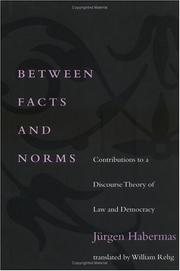
ISBN: 0262082438 Year: 1995 Publisher: Cambridge : M.I.T. Press,
Abstract | Keywords | Export | Availability | Bookmark
 Loading...
Loading...Choose an application
- Reference Manager
- EndNote
- RefWorks (Direct export to RefWorks)
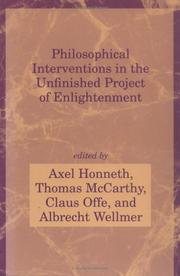
ISBN: 026208208X 0262581094 026227566X 0585337896 9780585337890 9780262275668 9780262581097 9780262082082 Year: 1992 Publisher: Cambridge (Mass.): MIT press
Abstract | Keywords | Export | Availability | Bookmark
 Loading...
Loading...Choose an application
- Reference Manager
- EndNote
- RefWorks (Direct export to RefWorks)
141.822 --- Critical theory --- Culture --- Philosophy --- Sociology --- -Mental philosophy --- Humanities --- Cultural sociology --- Sociology of culture --- Civilization --- Critical social theory --- Critical theory (Philosophy) --- Critical theory (Sociology) --- Negative philosophy --- Criticism (Philosophy) --- Philosophy, Modern --- Rationalism --- Frankfurt school of sociology --- Socialism --- 141.822 Ontwikkeling van het marxisme. Frankfurter Schule --- Ontwikkeling van het marxisme. Frankfurter Schule --- Social theory --- Social sciences --- Social aspects --- Philosophy. --- Critical theory. --- Culture. --- Mental philosophy --- Popular culture --- Sociology - Philosophy.
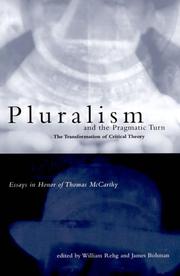
ISBN: 0262182165 0262681323 9780262681322 9780262182164 Year: 2001 Publisher: Cambridge (Mass.): MIT press
Abstract | Keywords | Export | Availability | Bookmark
 Loading...
Loading...Choose an application
- Reference Manager
- EndNote
- RefWorks (Direct export to RefWorks)
The essays in this volume reflect on and expand Frankfurt School critical theory as reformulated after World War II by Karl-Otto Apel, Jürgen Habermas, and others. Frankfurt School critical theory since the pragmatic turn has become a richer source of critical analysis that is at the same time socially and politically more effective. The essays are dedicated to Thomas McCarthy, who has done perhaps more than any other scholar to introduce English-speaking audiences to contemporary German critical theory.The book is organized into three parts. Part one deals with social theory and the rational basis of communication, including basic issues raised by the pragmatic turn. Part two examines conceptions of autonomy and the self. Part three deals with political theory, focusing on problems stemming from sociocultural pluralism. Together, the essays provide an overview of the latest developments in Frankfurt School critical theory as it responds to the challenges of pragmatism and social pluralism.
Frankfurt school of sociology --- Critical theory --- Cultural pluralism --- Pragmatism --- McCarthy, Thomas A., --- Frankfurt school of sociology. --- Critical theory. --- Cultural pluralism. --- Pragmatism. --- Sociology & Social History --- Social Sciences --- Social Change --- McCarthy, Thomas A. --- McCarthy, Thomas A., - 1940 --- -Frankfurt school of sociology --- McCarthy, Thomas A., - 1940-
Book
ISBN: 0262282259 058543705X 9780262282253 9780585437057 Year: 2001 Publisher: Cambridge, Mass. MIT Press
Abstract | Keywords | Export | Availability | Bookmark
 Loading...
Loading...Choose an application
- Reference Manager
- EndNote
- RefWorks (Direct export to RefWorks)
The essays in this volume reflect on and expand Frankfurt School critical theory as reformulated after World War II by Karl-Otto Apel, Jurgen Habermas, and others. Frankfurt School critical theory since the pragmatic turn has become a richer source of critical analysis that is at the same time socially and politically more effective. The essays are dedicated to Thomas McCarthy, who has done perhaps more than any other scholar to introduce English-speaking audiences to contemporary German critical theory. The book is organized into three parts. Part one deals with social theory and the rational basis of communication, including basic issues raised by the pragmatic turn. Part two examines conceptions of autonomy and the self. Part three deals with political theory, focusing on problems stemming from sociocultural pluralism. Together, the essays provide an overview of the latest developments in Frankfurt School critical theory as it responds to the challenges of pragmatism and social pluralism.
Frankfurt school of sociology. --- Critical theory. --- Cultural pluralism. --- Pragmatism. --- Frankfurt school of sociology --- Critical theory --- Cultural pluralism --- Pragmatism --- Sociology & Social History --- Social Sciences --- Social Change --- McCarthy, Thomas A. --- Cultural diversity --- Diversity, Cultural --- Diversity, Religious --- Ethnic diversity --- Pluralism (Social sciences) --- Pluralism, Cultural --- Religious diversity --- Critical social theory --- Critical theory (Philosophy) --- Critical theory (Sociology) --- Negative philosophy --- Frankfurt school --- Frankfurt sociologists --- Idealism --- Knowledge, Theory of --- Philosophy --- Philosophy, Modern --- Positivism --- Realism --- Utilitarianism --- Experience --- Reality --- Truth --- Culture --- Cultural fusion --- Ethnicity --- Multiculturalism --- Criticism (Philosophy) --- Rationalism --- Sociology --- Socialism --- Schools of sociology --- Marxian school of sociology --- PHILOSOPHY/General --- CULTURAL STUDIES/Critical Theory --- McCarthy, Thomas,
Book

ISBN: 0231166427 0231535880 9780231535885 9780231166423 Year: 2018 Publisher: New York, NY
Abstract | Keywords | Export | Availability | Bookmark
 Loading...
Loading...Choose an application
- Reference Manager
- EndNote
- RefWorks (Direct export to RefWorks)
Jürgen Habermas is one of the most influential philosophers of our time. His diagnoses of contemporary society and concepts such as the public sphere, communicative rationality, and cosmopolitanism have influenced virtually all academic disciplines, spurred political debates, and shaped intellectual life in Germany and beyond for more than fifty years. In The Habermas Handbook, leading Habermas scholars elucidate his thought, providing essential insight into his key concepts, the breadth of his work, and his influence across politics, law, the social sciences, and public life.This volume offers a comprehensive overview and an in-depth analysis of Habermas's work in its entirety. After examining his intellectual biography, it goes on to illuminate the social and intellectual context of Habermasian thought, such as the Frankfurt School, speech-act theory, and contending theories of democracy. The Handbook provides an extensive account of Habermas's texts, ranging from his dissertation on Schelling to his most recent writing about Europe. It illustrates the development of his thought and its frequently controversial reception while elaborating the central ideas of his work. The book also provides a glossary of key terms and concepts, making the complexity of Habermas's thought accessible to a broad readership.
Philosophy. --- Sociology --- Mental philosophy --- Humanities --- Habermas, Jürgen. --- Habermas, Jürgen --- Habŏmasŭ, Wirŭgen --- Habŏmasŭ --- Khabermas, I︠U︡. --- Khabermas, I︠U︡rgen --- Ha-pei-ma-ssu, Yu-erh-ken --- Habeimasi --- הברמאס, יורגן --- יורגן הברמס --- 哈贝马斯 --- Philosophy
| Listing 1 - 9 of 9 |
Sort by
|

 Search
Search Feedback
Feedback About UniCat
About UniCat  Help
Help News
News